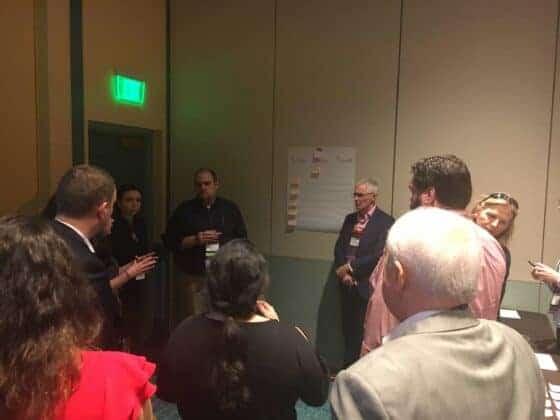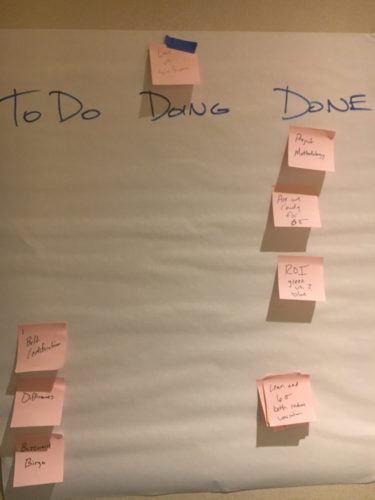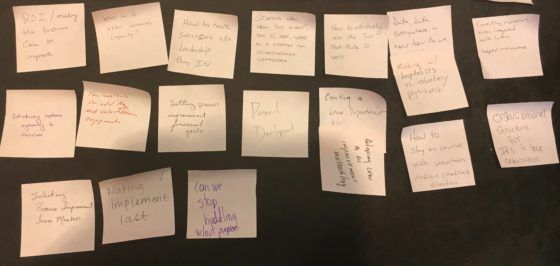Today's Post in <50 Words: Yesterday, Isaac Mitchell and I asked a group of Society for Health Systems Conference attendees what they wanted to talk about with peers and colleagues in the room. Here's that list and how the discussion was structured…
Yesterday, Isaac Mitchell and I facilitated an hour-long session at the Society for Health Systems Conference (hear my recent podcast with Isaac). Things continue today, so follow along today using hashtag #SHS2017.
Thanks to Jordan for taking this photo of us afterward:
Very fun and engaging session led by @IsaacMitchell and @MarkGraban at #shs2017. Love following their work online and connecting in person. pic.twitter.com/tudNxjKS37
— Jordan Aronhalt (@jr_aronhalt) March 2, 2017
Instead of the usual presentation format, we used the “Open Space Technology” approach for facilitating open, but structured, discussion. It was sort of a hybrid approach of that and the “Lean Coffee” format that I love.
We had about 30 people in the room, I think.
We asked people to brainstorm somewhat topics that they'd want to discuss in groups.
We got these generated in a few minutes (click for a larger view):
Topics included:
- ROI / making the business case to improve
- What to do after increasing capacity?
- How to have success without leadership buy in?
- Starting Lean “from the middle,” the PI department, instead of a directive from senior / executive leadership
- How to effectively use the “Two Feet Rule” at work
- Working with hospitalists vs. other physicians
- Lean vs. Six Sigma
- Connecting improvement across the integrated health systems (hospitals & insurance)
- Organizational structure for industrial engineers in your org
- How to stay on course with uncertain CMS direction
- Adopting Lean as an improvement methodology
- Personal development
- Benchmarking
- Setting process improvement financial goals
- How consultants can add the most value locally between engagements
- Management engineering consulting rates / marketing consulting to healthcare
- Introducing systems engineering to clinicians
- Selecting process improvement team metrics
- When to ask for more resources
- Making implementation last
- Can we stop huddling without purpose
Everybody in the room got two votes to put toward topics they wanted to discuss. You could choose two topics or put two votes on the same topic if you really wanted to.
These got the most votes:
- Lean vs. Six Sigma
- Benchmarking
- When to ask for more resources
- Management engineering consulting rates / marketing consulting to healthcare
So, we had four sheets of paper around the room. The rule of two feet said people could choose where to go participate. And, if they weren't learning or contributing or interested, they could move.
Each group brainstormed more specific topics and talked for 30 minutes in a Lean Coffee format, as pictured below.



Isaac live streamed some of it:
Open space #shs2017 ! https://t.co/5oB5sOJB0Z
— Isaac B. Mitchell (@IsaacMitchell) March 2, 2017
After 30 minutes, we asked each team to summarize some “epiphanies” and key points to report out to the whole room. Each team had 3 minutes and none of the spokespeople from the groups ran long. Such good engineers :-)
Thanks to everybody who participated!
I'm going to share that list of brainstormed topics with the SHS leadership team. It's interesting to see what the responses were to a very open-ended question of “what do you want to talk about with peers?”
Please scroll down (or click) to post a comment. Connect with me on LinkedIn.
Let’s work together to build a culture of continuous improvement and psychological safety. If you're a leader looking to create lasting change—not just projects—I help organizations:
- Engage people at all levels in sustainable improvement
- Shift from fear of mistakes to learning from them
- Apply Lean thinking in practical, people-centered ways
Interested in coaching or a keynote talk? Let’s start a conversation.











I love the format and approach of asking what would you like to talk about. This is the premise for real coaching that triggers engagement and pulling others to new levels of awareness through the discussions. Excellent!
Thanks, Rick. I was happy to also learn that many SHS members are hosting Lean Coffee discussions around the country.
Let’s do this in the DFW area sometime with our Lean group!
I would like to know about Connecting improvement across the integrated health systems (hospitals & insurance). As i worked for a health care insurance company as a business analyst, there was no lean methods implemented and they were many errors in the process with regards to the staff. what would be a better way of implementing lean in a company like that for the first time? what are the appropriate methods specific to Health insurance companies? How does lean differ for a corporate company and a health care system?
I think a great starting point is asking the question, “What problem are we trying to solve?” A health insurer has different problems than a car factory or a hospital. The key is to use the same mindsets, including the idea of engaging everybody in improvement.
See this post and video.
Thanks for the comments.
I’d also encourage hospitals and insurers to work together on improving across the “extended value stream” that they are both a part of. Work together for the benefit of the customers (the patients and those paying for care).